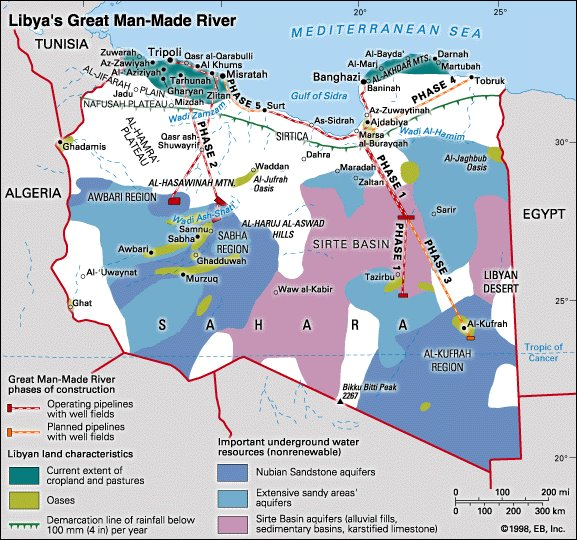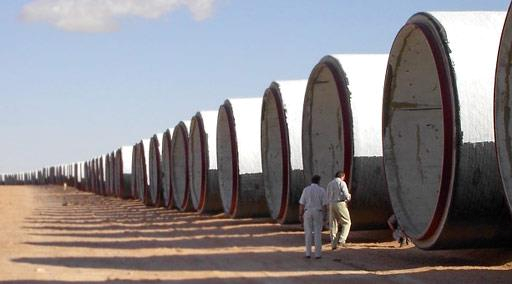
Advertisement
Great Man Made River Project

Welcome to the official page dedicated to one of the greatest civil engineering achievements of the modern era — The Great Man-Made River (GMMR).
Born from the vision of Muammar Al Gaddafi, the GMMR was designed to unlock Libya’s ancient underground water reserves and bring fresh, clean water from deep beneath the Sahara to the coastal cities, farmlands, and communities of Libya. This monumental project has been described by engineers, environmentalists, and world leaders alike as "the largest irrigation project in the world."
With over 1,600 wells, stretching more than 4,000 kilometers of buried pipelines, the GMMR became a symbol of self-reliance, sovereignty, and sustainable development — built without loans or Western corporate control.
This website explores the history, science, and legacy of this visionary project — a lifeline that still serves millions today, despite years of conflict and sabotage.
(PHASES II)
Until it reaches near Tarhunah and section east off in the direction of the north-east and when the plug follows the line path along the coastal road passing near the cities of Misurata, Zeliten and five until it reaches the Qara Bolli where the reservoir budget on high (160) meters above sea level and from this reservoir is connected to water to the area in and around Tripoli, in addition to the territory of the fertile plain Alajafarh.

Great Man Made River Project 1984 - 2011
Project Name: Great Man-Made River (GMMR)
Initiated by: Muammar Al Gaddafi
Start Date: Officially launched in 1984
Scope: Transfer of water from As-Sarir and Tazerbo wells to Benghazi and Sirte
Infrastructure: 1,600 km of pipeline
Storage: Construction of large reservoirs like Omar Mukhtar Reservoir
Scope: Supply of water from Fezzan (southern Libya) to the Western coastal belt including Tripoli
Pipelines: Roughly 1,300 km
Built to serve: Capital Tripoli and surrounding areas
Goal: Link the eastern and western systems and expand connections to more towns
Integration: Unified water grid across major urban and agricultural zones
Enhancements: Construction of additional pipelines, pumping stations, and reservoirs
Status: Partially completed due to NATO bombing in 2011, which damaged GMMR facilities and halted work

The Great Man-Made River (GMMR) – Libya’s Forgotten Engineering Wonder
Often referred to as “the eighth wonder of the world,” the Great Man-Made River (GMMR) was one of Muammar Al Gaddafi’s most ambitious and visionary projects — a massive underground water system designed to bring fresh water from the Saharan desert aquifers to Libyan cities and farmlands.
This vast, self-funded infrastructure project transformed arid land into productive farmland and provided clean drinking water to millions, without foreign debt or Western control.
Though heavily damaged and forgotten after the 2011 NATO-backed war, its legacy stands as a powerful symbol of African self-reliance and visionary engineering.
You can explore more about this incredible project via the archived official website below:
🔗 Archived GMMR Website (via Web Archive)
📌 Note: For best viewing, please use a desktop or laptop device, as the archived website layout may not be mobile-friendly.
Working on more content!
Re-building this great project website
Advertisement

Read the GREEN BOOK